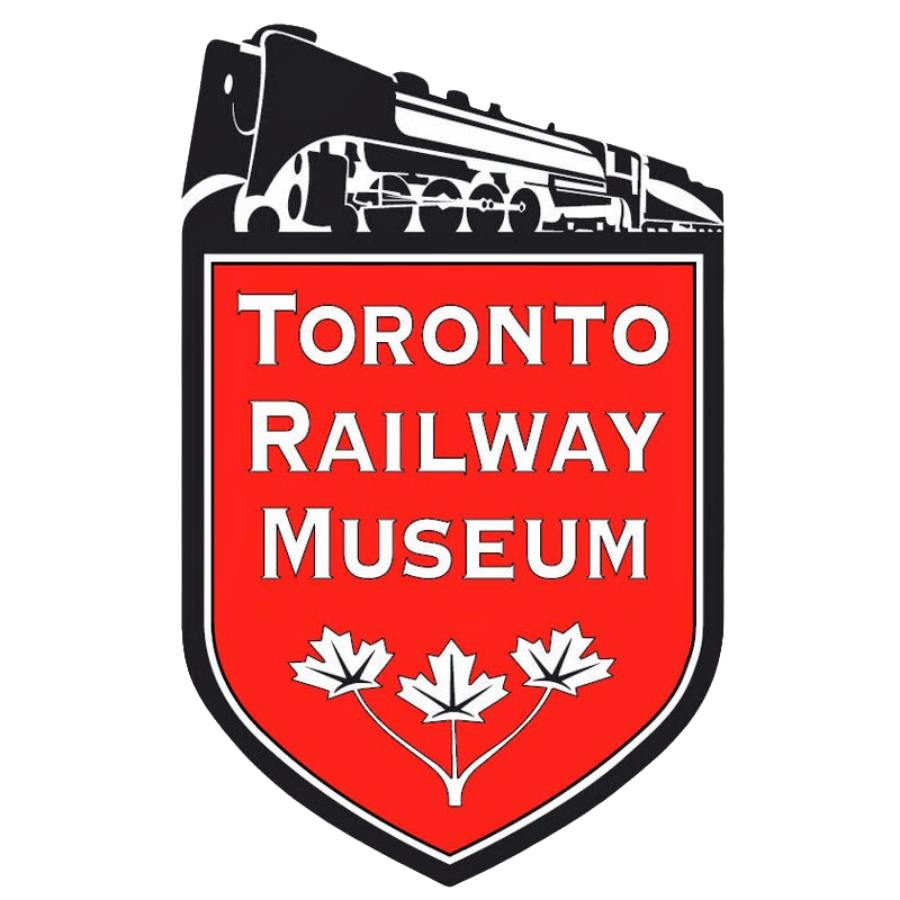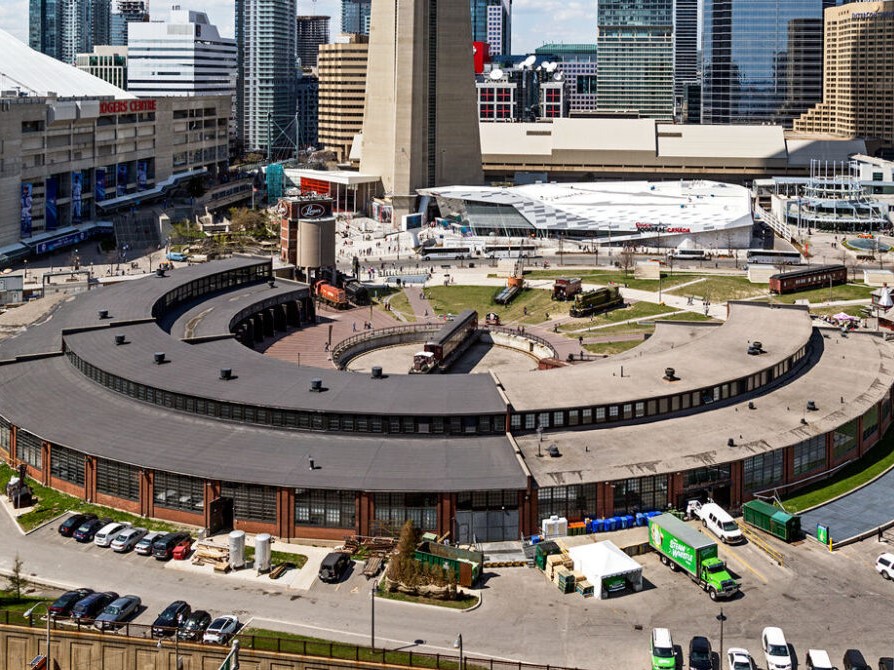From Train Service to Bar Service: Links to Ontario Railway History in Craft Beer (Part One)
For as long as I can remember, I have had a passion for learning the history of Ontario’s railways. Another passion of mine is Ontario Craft Beer. I find the brewing process and the many different styles fascinating and enjoy supporting local businesses by purchasing their product.
I have been a researcher with the TRHA for just under a year now. My primary project has been cataloguing the many train stations present in our database to make a research document for the Web Presence team. As I’ve gone through the list and researched each station, I’ve noticed that many are still in use today as either a brewery, brewpub, or restaurant that serves craft beer. Concurrently, as more and more craft beers have entered the market, I’ve begun to see more examples of beers that make reference to local railway history.
In this blog post, I thought I’d highlight some of these examples. It is a surprisingly big topic, and as such will be broken into several parts. This part focuses on former railway buildings that are in use with the production and distribution of craft beer and other alcoholic beverages. So pull up a chair, crack a cold one, and let’s get started!
Steam Whistle Brewing, Toronto, ON/CPR John Street Roundhouse
A logical place to start as this location also houses our museum! The John Street Roundhouse was built by the Canadian Pacific Railway between 1929 and 1931. It was one of two massive roundhouses that stood in downtown Toronto to the southwest of Union Station. The first, Canadian National Railway’s Spadina Roundhouse, was demolished in the eighties and stood where Rogers Centre stands today.
The John Street Roundhouse was essential for the servicing, repairs, and storage of hundreds of CPR locomotives operating trains in and out of Toronto. The site remained in use long after the cessation of steam locomotives in 1960, providing service for CPR and VIA Rail diesel locomotives for an additional twenty-six years. In 1986, the facility was closed and donated to the City of Toronto with the intention of becoming a railway museum, which was ultimately accomplished by way of the Toronto Railway Museum.
Steam Whistle Brewing first became a brewery in 1998. It was the brainchild of three former microbrewers who found themselves looking for work after the microbrewery they previously worked for was bought up by a larger corporation. For many years, Steam Whistle produced only one beer, their flagship pilsner. Easy drinking and easily recognizable by its green bottle, it embraced the mantra of “do one thing really, really, well”. They have expanded to produce others including a pale ale, session lager, and a lemon shandy. Steam Whistle occupies bays 1-14 of the roundhouse.
To learn more about the John Street Roundhouse click here.
To learn more about Steam Whistle and their story click here.
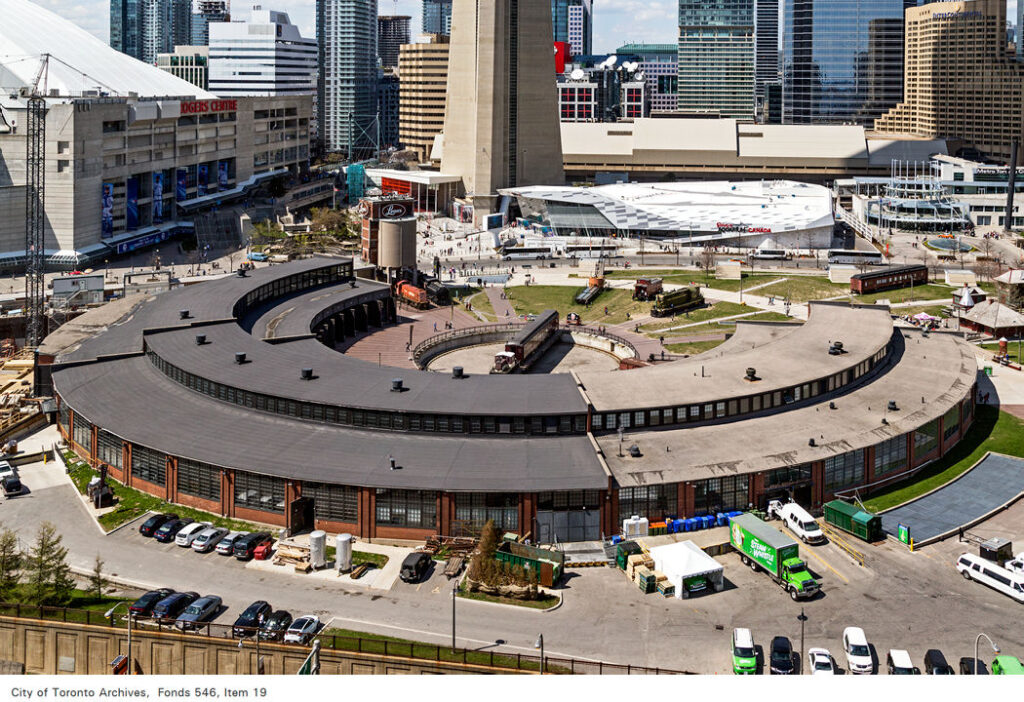
Broken Rail Brewing, St Marys, ON/GTR St Marys Junction Station
Broken Rail Brewing is located in the Grand Trunk Railway’s St Marys Junction station, which was originally built in 1858. Built north of town, the station was the first of five that have stood in St Marys. It formerly served as a junction point for trains operating on the Thorndale and Forest Subdivisions headed to and from London and Sarnia, respectively. Over time its location far from downtown made it redundant compared to the more central third station built in 1907. The junction station was closed in 1941 but fortunately was acquired and preserved as a national historic site. For many years, a preserved GTR caboose has stood nearby on a short stretch of track.
Broken Rail Brewing began operations in February 2021. The team at Broken Rail are passionate about brewing good beer as well as paying homage to local history. Their core four beers, Square Nail Amber Ale, Incandescent Blonde Ale, Tesla’s Revenge IPA, and Overnight Express Stout, make references to both the railway and historical figures such as Thomas Edison, who was formerly employed by the Grand Trunk Railway at the station. “Square Nail” is in reference to the square type of nails used in the construction of the station.
While modifications have been made to the interior and exterior to make it into a brewery, the station stands as one of the best preserved examples of an original stone GTR station. Getting to see the interior of this building was definitely a special treat!
For more information about the brewery, click here.
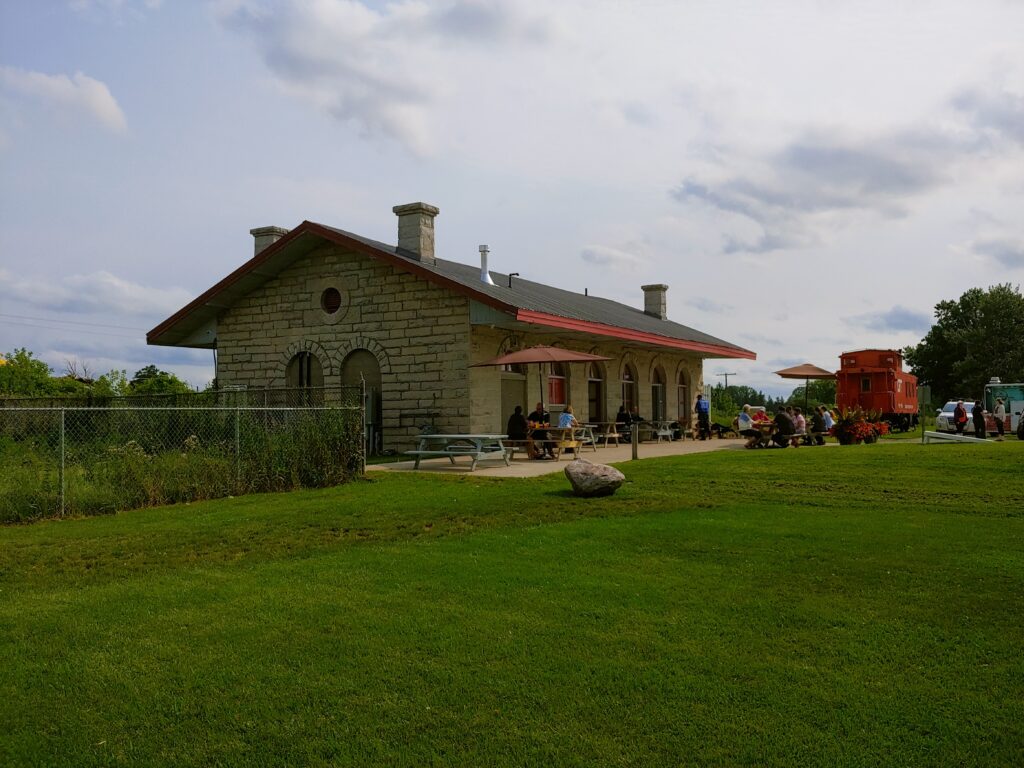
Summerhill LCBO, Toronto, ON/CPR North Toronto Station
While it’s not a brewery, this next site is a former station with a strong connection to the sale of beer and other alcoholic drinks. The Summerhill LCBO is one of the largest LCBO stores in Toronto. It also formerly served as the Canadian Pacific Railway’s North Toronto station.
This station opened in 1916. Located on the east side of Yonge Street and north of Price Street, it was the second station to stand in this area. It replaced an earlier structure that stood from 1884-1916 west of Yonge Street on the south side of the tracks near where Cottingham Street used to cross the rails. It was a busy station from its opening until 1927 when the present Union Station was opened. This, combined with the onset of The Great Depression in 1929, caused a decline in service that the station would never recover from, causing it to close in 1930. While there were two short reprieves by way of reopening for both the Royal Train tour of 1939 and the return of WWII soldiers in 1945, the station remained closed and all remaining trains ran south to Union Station.
North Toronto Station served a strategic purpose for affluent residents living in Rosedale and other nearby neighbourhoods. Special summer excursion trains would operate to northern locations such as Bobcaygeon and Bala in the early 20th century. Businessmen would board the train on a Saturday during the noon hour at Union Station after working a half day. On the return trip on Sunday evening, the train would drop its passengers off at North Toronto Station, located much closer to home. At a time before the existence of the TTC Subway, this was indeed a convenient arrangement. With all of today’s passenger trains shuttling along the Union Station Rail Corridor, the idea of a northern terminal does sound appealing.
For many years, the building sat mostly dormant. The LCBO and Brewers Retail operated facilities at opposite ends of the building. However, significant portions remained walled up. The building received protection as part of the Ontario Heritage Act in 1976. After many decades, the building was purchased and converted entirely into an LCBO store. Unlike before, all parts of the lower floor were incorporated into the store plan, including the great hall where passengers previously waited for trains, and where shoppers currently browse the wine section. The clocks were also returned to the tower as well having been removed during the fifties.
A great example of a former railway station returning to a second life through a connection to beer and other spirits. I’ve only made one visit to this site, doing so in the fall of 2014. My purchase of the day was a selection of pumpkin beers in honour of the changing season!
To learn more about both North Toronto Stations, click here.
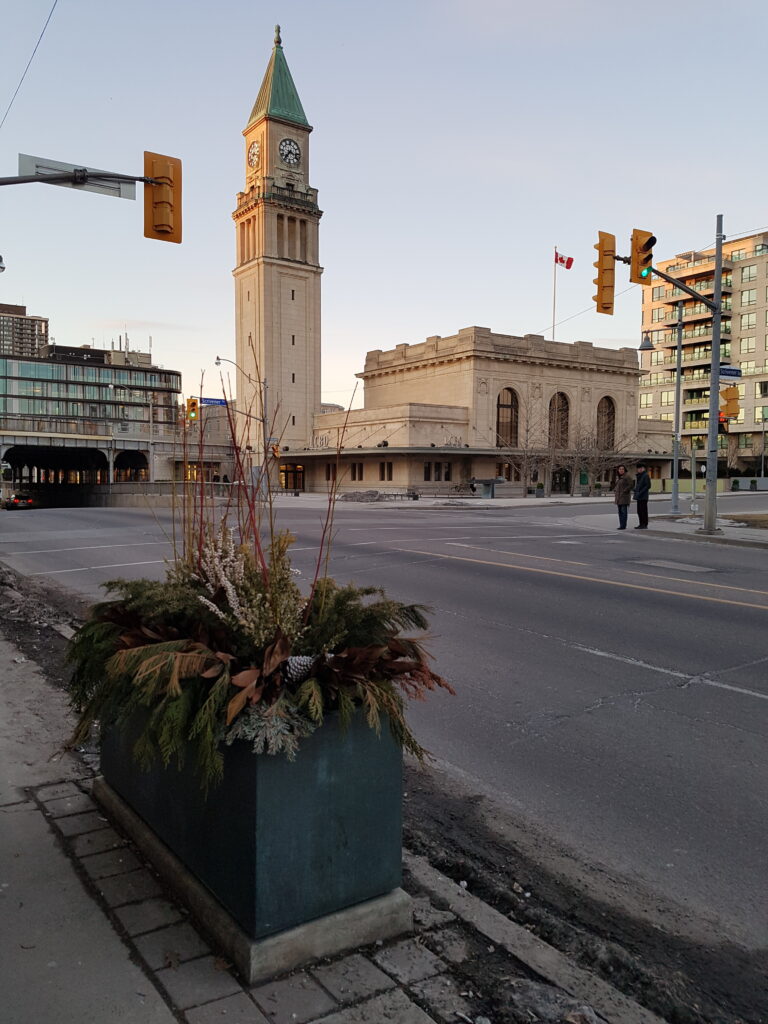
Want to learn about more connections between railways and craft beer? Make sure to check out the second part of this series where we explore stations that have been converted into a brewpub or restaurant where craft beer is served.
Historical Sources
Boles, D. (2021, January/February). Once Upon A Timetable: Canadian Pacific’s Toronto Passenger Service in 1930. Branchline, 60(1), pp. 3-12.
Boles, D. (n.d.), John Street Roundhouse and Roundhouse Park, Toronto Railway Historical Association. https://www.trha.ca/trha/collections/structures/john-street-roundhouse/
Broken Rail. (n.d.). About Broken Rail Brewing. Retrieved on August 7th, 2021 from https://www.brokenrailbrewing.ca/
Broken Rail. (n.d.). Our Beers. Retrieved on August 7th, 2021 from https://www.brokenrailbrewing.ca/our-brews
Heritage Property Detail: 10 Scrivener SQ. (n.d.). City Of Toronto. http://app.toronto.ca/HeritagePreservation/details.do?folderRsn=2431929&propertyRsn=690652
North Toronto Station & LCBO Flagship Store. (n.d.). Eastern Construction. https://www.easternconstruction.com/portfolio/north-toronto-station-lcbo-flagship-store
Peltenburg, A. (n.d.) North Toronto Station. Toronto Railway Historical Association. https://www.trha.ca/trha/history/stations/north-toronto-station/
Steamwhistle Brewing. (n.d.). Our Story. Retrieved August 7th, 2021 from https://steamwhistle.ca/our-story
St Marys Junction Railway Station (Grand Trunk) National Historic Site of Canada. (n.d.). Parks Canada Directory of Federal Heritage Designations. https://www.pc.gc.ca/apps/dfhd/page_nhs_eng.aspx?id=519
Summerhill LCBO. (n.d.). Rula Maps. http://apps.library.ryerson.ca/archapp/map_info/344
Tomlinson, D., (2021, February, 12). St Mary’s Canadian Pacific Railway Part One. St Mary’s Museum. https://stmarysheritagefair.wordpress.com/2021/02/12/st-marys-canadian-pacific-railway-part-one/?fbclid=IwAR0gp4GvaciB7hR4wtGUydDbmRHdoZ78YdOJg4WmCNXNZKmoZGuJVTClsv8
Tomlinson, D., (2021, February, 12). St Mary’s Canadian Pacific Railway Part Two. St Mary’s Museum. https://stmarysheritagefair.wordpress.com/2021/02/12/st-marys-canadian-pacific-railway-part-two/

